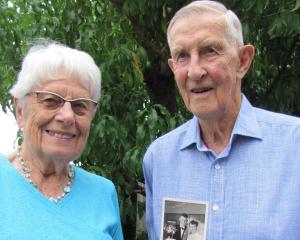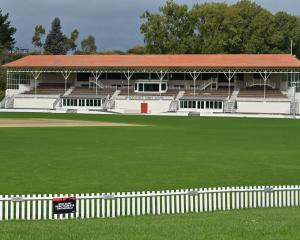No doubt there are problems in Kenya but there are floods, earthquakes and oil spills in New Zealand.
The biggest thing we notice in our daily lives is the large gap between rich and poor. However, we did expect that.
Police violence is something we have had second-hand experience with, as our house staff come from a slum in Kawangare, where a few incidents have taken place since we arrived. Police here are armed but are often under-trained and under-paid.
They are therefore prone to corruption and not equipped to make the best decisions when using firearms. This in turn provokes some people to riot, and burn vehicles and dwellings.
The consistent theme in the media here mainly relates to corruption in government. But we have not been directly affected, as we take the usual precautions necessary in a large city in a developing country.
We live in a compound with "Askari" (security guards). Our cars lock automatically when their ignition is engaged and we do not walk outside at night.
Our family car was deliberately chosen with a few dents in it so it does not attract car-jackers. As relatively well-off "Mzungus" (Pakeha), we are in the minority.
But now we are familiar with our surroundings, we feel comfortable.
The terrorism threat was probably the most real in October. Security at the malls we visit and the girls' (Holly and Charlotte) school was increased.
But, for the most part, life continued as normal.
Artcafe in Westgate Mall, our usual coffee haunt, was considered a significant target due to its customers being mainly expats and Mzungus.
Before October it was standard for the Askari to check your car boot and under the front of your car for bombs before you got a ticket to park at the mall. Now they also check your handbag and run a scanner over you before you enter the shops.
While the threat may be real, we do not notice it on a daily basis. We are more likely to be sunburnt or caught up in a car accident here. It seems that international media are making more of the threat than we feel on the ground.
It has reminded us of when we lived in Buenos Aires and the local English paper ran a story that the Maori in New Zealand were on the verge of revolution.
In reality, there was a small protest in front of the Beehive on Waitangi Day. Generally, Kenyan people are extremely polite and particularly kind to children.
We employ two lovely sisters, Janet and Matilda, to help us with the children and the house.
However, we have experienced our fair share of corruption and petty crime. We must pay exorbitant amounts to Customs to receive parcels from home, around 100% duty. If you do not pay, the theory is that Customs staff will keep the parcels.
We have returned parcels to sender to thwart that plan. Our first house cleaner stole cash from a visitor's suitcase. Ironically, they were New Zealand dollars, which she is unlikely to be able to exchange in Nairobi. Although she would have been better off in the long term to keep her job with us, Kenyans often live in survival mode.
When you live in a slum with no social welfare assistance, a little cash in the hand today is too hard to resist.
It is expected that you employ house staff. Indeed, it helps the economy. It also gives you a chance to help some of the locals directly.
For example, we pay school fees for our housekeeper's daughter so she can finish high school.
Education is expensive here but is the real key to escaping poverty.
We live in Museum Hill, near Parklands, which historically is an Indian area.
We have an apartment in a compound of about 62 apartments with communal garden, pool, gym, playground and party hall. It is centrally located, which is a must due to the traffic jams in Nairobi.
There are no footpaths to speak of, so walking very far is not an option.
The most common form of public transport here is the "matatu" (minivans). They are hard to use effectively unless you know good Swahili, as there is no standard rate of fare, so you are likely to get ripped off.
They are often overloaded and drive as fast as they can to get to their destination, along closed shoulders on the road, in the wrong direction and down third lanes on single lane roads. If you see a matatu coming, give way!
Nairobi is the hub of East Africa and there are a lot of Western comforts here, particularly Indian and British imports. You can pretty much find everything, although if it is imported, it will be expensive.
The climate is wonderful and consistent. It rains around October and November and around April and May. Otherwise is it is sunny and about 25degC every day.
In the short time we have been here, the Kenyan shilling has weakened significantly and the cost of living has skyrocketed. As a generalisation, it is cheaper to have a lifestyle here - to have someone watch the kids, have a meal out and go to the movies.
But it is more expensive to acquire "things".
Having spent three days over the Christmas break in the Masai Mara, on safari, we got a great insight into another side of Kenya.
We were the only people at the camp on a private conservancy about an hour's flight from Nairobi. It was an amazing experience, being a matter of a few metres away from all of the wildlife in their natural environment.
We saw lions hunting down buffaloes, leopards eating their prey up trees, elephants, giraffes, zebras, hippos. Every animal you could imagine seeing in Africa we saw it, except the elusive cheetah.
The girls loved every minute of it and by the end of it Holly (5) was like a safari guide and knew all the different types of antelope by size, colour and horn length.
Cricket-wise, things are starting to take shape nicely after a tough start with player strikes.
The side's key focus has been the twenty/20 world cup qualifiers in March in Dubai. Having not qualified since the inaugural tournament in 2007, just qualifying with a new side would be an excellent achievement and help secure future funding for the game in Kenya.
Only two of the 16 teams qualify in Dubai, so there is plenty of work to do to give ourselves the best chance.
We are currently in India playing twenty/20 and one-day matches against Andhra Pradesh, and have started very well, with our batsmen scoring four hundreds in the first thee one-day games.
Batting has been an area that has desperately needed attention and the players have worked very hard on it, so nice to see some progress on the field.
Facilities in Nairobi are a mixture with the practice pitches being very good, although finding a quality outfield for fielding practice is difficult. All of the training grounds are privately owned, so keeping a good relationship with these clubs is paramount if you want to use the best facilities.
While nothing is ever simple in Nairobi, it is definitely interesting and the simple life in Dunedin can seem quite dull in comparison.












